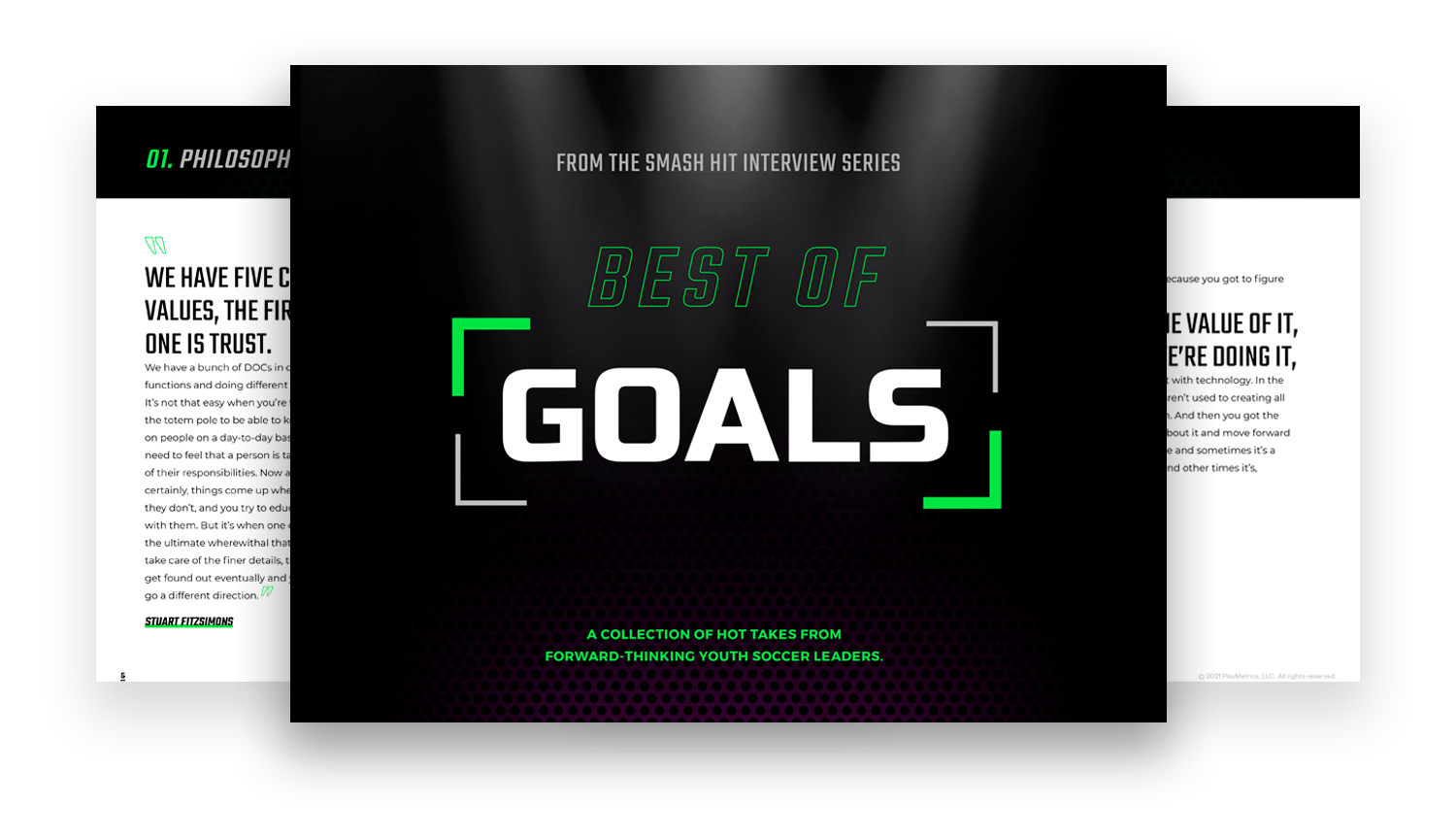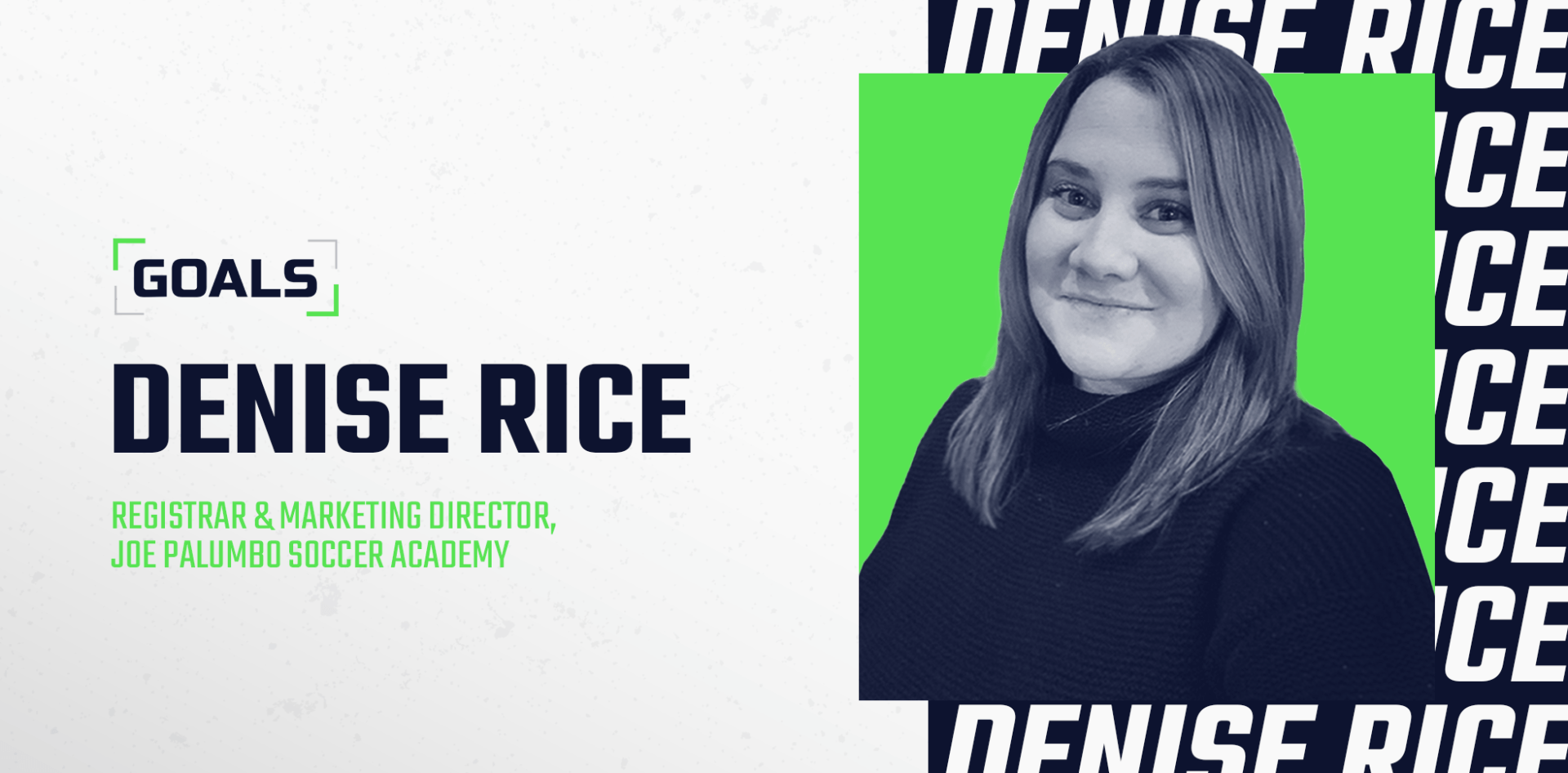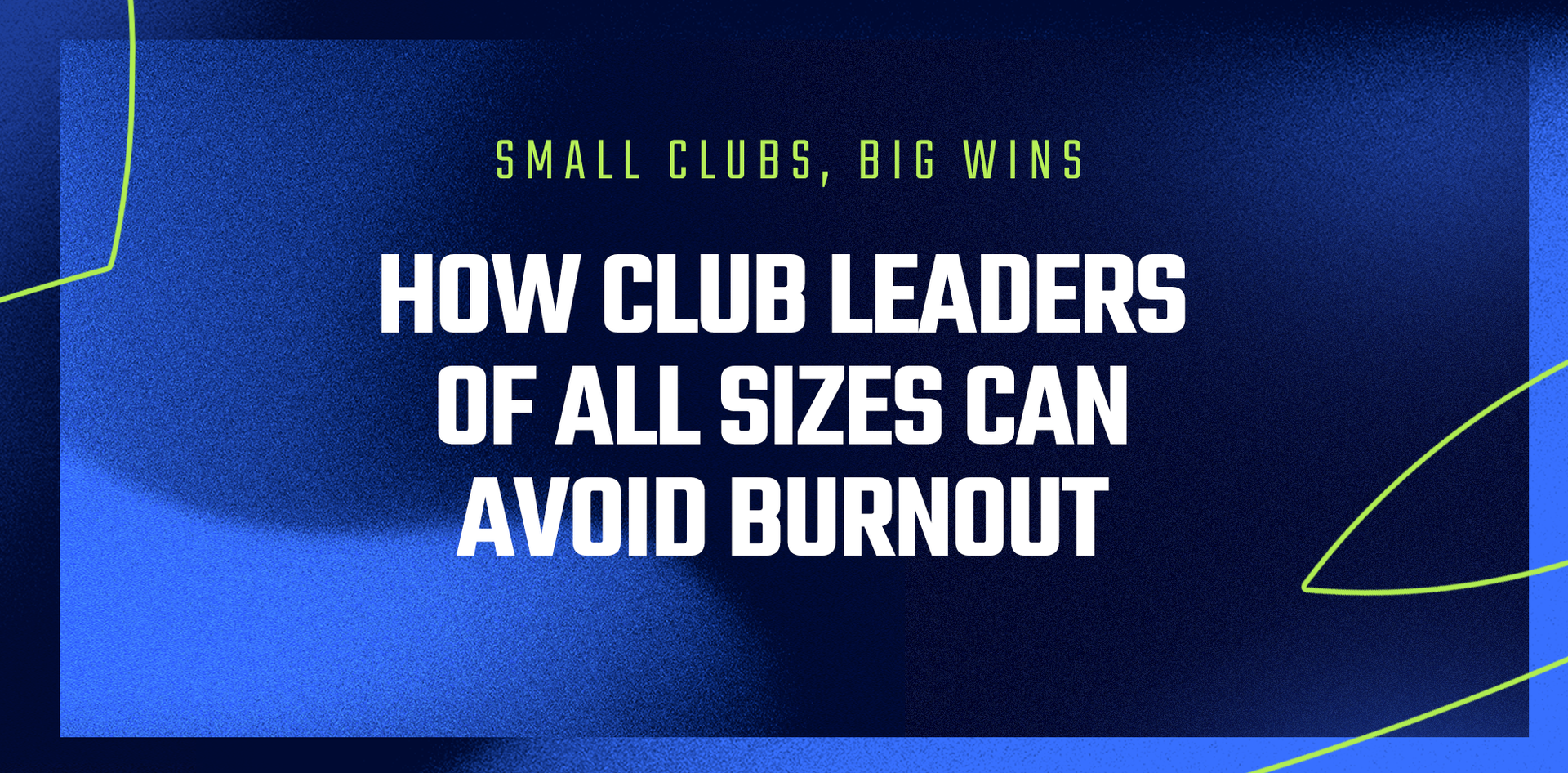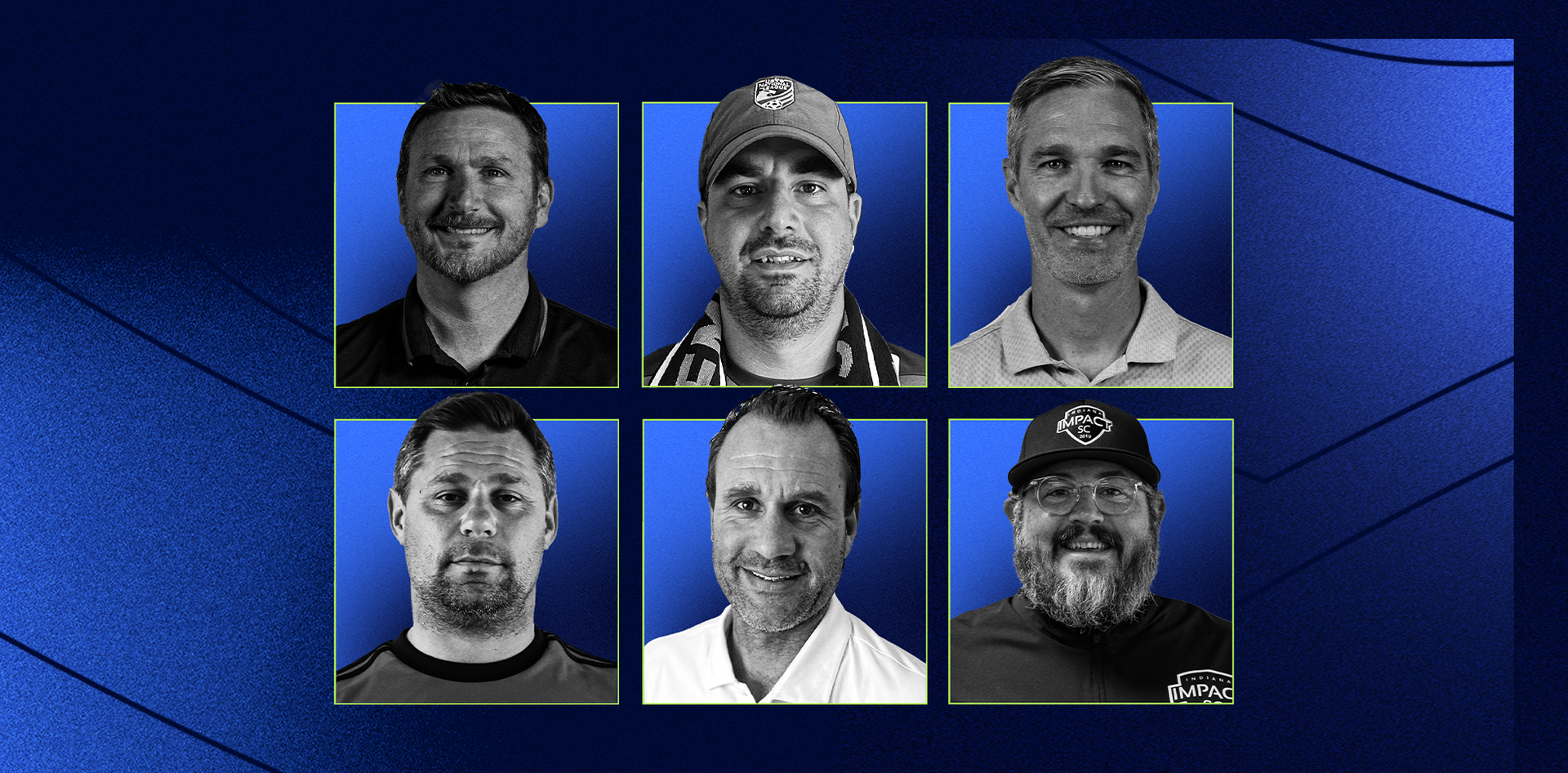“Look mom, it’s Joe Palumbo’s daughter.”
It’s not uncommon for Denise Rice to overhear the whisper on any ordinary outing. While she would never self-identify as such, some would say she is “soccer royalty” in her Putnam Valley, NY, community. Her father immigrated from Italy as a child and grew to fulfill his dream (and cement a legacy) by creating the Joe Palumbo Soccer Academy. If true, then she is royalty who put in the work. From an early age, Denise jumped in to help anywhere she could, from “schlepping” cones and balls to working the snack bar.
But don’t let the family ties fool you into thinking she walked right into a leading role at the Academy and its club organization, Just Play Soccer Club. Her goals were different.
After an injury ended her soccer career when she was a freshman in college, Denise found herself in a space a lot of us do in our late teen years; lost.
She left school to “figure it out,” realized she wanted to be in radio, enrolled in broadcasting school, and got a job at a local station. But she never disconnected from the club that helped raise her. She was a regular at the games and around the offices when she’d stop to have lunch with her dad.
It was only a matter of time.
Today, Denise is the registrar and marketing director, and a walking advertisement for everything Joe Palumbo Academy. Her effervescent personality and enthusiasm for the kids she serves is as genuine as it is boundless. And while “Palumbo” as it is affectionately called, is a smaller organization, they operate and run with the same care, business sense and approach as the big guys.
Denise Rice may be known around town as “Joe Palumbo’s daughter,” but make no mistake, she is making her own mark on youth soccer families. In this interview Denise talks tradition, how she keeps her radio chops sharp, what still surprises her in youth soccer, and more about the path that led her home.
Tell us the Joe Palumbo Soccer Academy origin story.
DR: My dad, Joe Palumbo, came to this country from Italy when he was 13 years old. Having this Academy was always his dream. At first, it was just camps and clinics. He studied to be a teacher and loves to teach the kids the game. He was never really into the big club status and system. He just wanted to grow the game and teach kids.
We’re a smaller club located in Putnam Valley, New York. The Academy has more than 1,000 players among all the programs throughout the year. Between part-time and full-time, we have about 15 staff members. All of our coaches are paid positions.
The Academy is open to everyone and you can sign up on a program-to-program basis. We also have the Just Play Soccer Club which is more of a commitment. You’re here two times a week every week and games on Saturdays and Sundays. The Just Play Soccer Club consists of upwards of 24 travel teams, about the same size as other clubs we compete against in the league. Regardless of whether it’s the Academy or Just Play Soccer Club, everyone refers to it as “Palumbo.”
How old were you when you started working in the family business?
DR: I was three or four when it all started so it’s been a part of my life for as long as I can remember. It’s special to me now that I get to give back not only to my dad, his craft, and what he’s built, but also to our youth. It’s important to me that his legacy and what he believes in are still part of our day-to-day. Our staff must know his history, and our parents and players know the history. It gives everybody a sense of family and a sense of home.
I’ve been working at the camps and the Academy since I was 12. Probably too early to even work! I would help as an assistant with the youngest kids, schlep the cones and the balls. I’ve always had a big, bubbly, outgoing personality, so that was natural for me. I’m a lot like my dad. I also worked at the snack bar. When it’s family, you just jump in where you’re needed.
It’s special to me now that I get to give back not only to my dad, his craft, and what he’s built, but also to our youth.
Surely you didn’t only schlep cones. How about your on-field experience?
DR: I played center midfield or outside midfield up until college. I went to Western Connecticut State University, but an injury during my freshman year put an end to my soccer career.
And now it’s you and your brother running the show?
DR: I became my mother and my brother, James, became my father. James is more into the soccer management side of things and what’s happening out on the field. I am involved in the administrative side. I take care of the behind-the-scenes. There’s so much that goes into the final product that I think people don’t realize. You have to have players rostered, you have to have players approved, background checks for our coaches, and on and on.
Tell us more about Denise’s story. You weren’t sitting around waiting for your parents to retire.
DR: It’s not like I always knew that I wanted to be a part of the Academy. I went to school for elementary education, and then when I got hurt, I left school altogether. I was a lost 18-year-old and went home to figure it out. That’s when I realized that I wanted to be on the radio, so I enrolled at the Connecticut School of Broadcasting. Even though I didn’t go on to be a radio broadcaster or work in television, I like that I can make it a part of my work now. I’ve done podcasts, and I also direct the media and the marketing part of the business. We’re making videos daily and doing interviews with the kids. It contributes to my day-to-day life.
Where on the timeline did you realize you were destined to work with your dad?
DR: I got a job working at a local radio station, mainly bringing coffee and doing other things in the background. And even though I wasn’t active in the business for some time, I was always interested in what was going on. I’d go to the games, come by the office and have lunch with my dad. It’s funny because now that my dad is retired he does the same with me. My path just led me back naturally.
How many clubs in your region do you compete with for members?
DR: About 15 to 20. There are clubs that are less expensive and don’t require as much of a commitment. You get to play with your friends from school. And then there are the more prestigious clubs for kids at a certain level who want or need more. We fall in the middle category. We’re serious, we value commitment and preach that, but we’re not drill sergeants.
And then there are the clubs that have the status of being affiliated with New York City FC, the Red Bulls, or a club in Europe. Those clubs have more status to say if a kid plays there then he or she must be really good. That might not be the case, it’s just how they sell themselves.
What have you done to get that across in your messaging?
DR: We’re impacting kids. They grow up and some of them go on to play professionally and some of them don’t. But I think the biggest thing, which I say and my dad always says, is that we’re just as proud of the kids that they didn’t go on to be a professional or didn’t go on to play in college, but they studied law for seven years and they’re one of the best lawyers in their city. They’re good people.
So I think that’s more of what we try to show in our brand. Yes, we’re developing soccer players, but we’re also developing young people who, when they get to the real world and get a job and move on with their lives, they have good values and principles. Our motto is ‘skill, sportsmanship, and self-discipline.’ That applies to the game, but it also applies to life. You have to have discipline in your life to get up at 6:00 AM and go to the gym because you want to feel good and have a productive day. These values are things that they learn to be the best person they can be, not just be the best soccer player in the world.
What are some unexpected things you learned in running the business side of things?
DR: There’s so much that goes into preparing a coach, administrative-wise, for a game. It could be different in other clubs, but in ours, we do a lot of the heavy lifting because they have to be concerned about what’s happening out on the field. I do a lot of the work making sure that all of the players that you’re going to have at the game on Sunday can even step on the field. So their rosters, printouts for the referee, passes that they have to bring, and protocols now with COVID. Making sure every kid, every parent does their health screening before they get to the field. Recording scores and standings after the game, the list goes on.
In your experience growing up in the business and where you’re at now, how have you seen the role of parents change?
DR: I have a unique perspective because I used to hear my parents talk about this when I was young. I think the way that it’s changed the most is that clubs are so prevalent now. Nobody plays for their school anymore. Everyone has to play at the highest club, at the best academy, or at the best place to go to college and get a scholarship or go overseas and play professionally. I think the societal change that people see, even outside of soccer, is to be the best. When I was younger, there wasn’t so much pressure. It was more understood that this could be a hobby for your kid and that could be where it ends. Where now, I think parents are pushing the best.
There are plenty of parents that just want their kids to play and have fun. And if they end up playing baseball in their senior year of high school, so be it. This is something that their friends are doing, they enjoy doing it, and they’re learning good things about values, about life, about soccer. They’re happy, it’s a good environment, and a healthy situation for their kids. But, I think that’s less common today.
Do you think the kids have greater expectations as well, or are they still there to mostly have fun?
DR: I think the kids have remained constant. They are there to play and enjoy themselves. Now some serious kids say, “Really, mom, I need to be playing in Barcelona.” For sure.
What skillsets and personality traits do you think are best suited for someone in your role?
DR: The biggest is to be comfortable communicating. Something I struggle with even now is telling people what I need rather than just doing it myself. Nobody can take on this world alone, nobody can take on youth soccer alone. It is way too big of a burden. I don’t like to ask for help. I don’t like to say that I’m overwhelmed and I need somebody to do something for me. The hardest thing for me was learning to communicate that way.
The other thing that is important in youth soccer, is you have to be patient. These kids are not going to be Messi overnight. Let’s slow down. Let’s enjoy a kid scoring a goal this weekend that he’s probably super psyched about. Let him enjoy that before jumping in to do more. I think you have to be patient in the process, and that goes for the kid who scores 50 goals, and it also goes for the kid who isn’t scoring any or doesn’t feel like he fits in. You have to be patient, they’re kids, and they grow and develop at different stages.
You have to be patient in the process, and that goes for the kid who scores 50 goals, and it also goes for the kid who isn’t scoring any or doesn’t feel like he fits in.
What do your mom and dad think of the way you work and manage the club today?
DR: My dad is amazed at everything because he still needs me to turn on the computer for him and log him into Instagram. There were so many things that I didn’t know how to do when I first started and my mom was onboarding me. I was like, “Wow, mom, you’re so great at Excel. This is amazing.” And now I just do things and she’s like, “What was that? How did you even do that? Wow, I wish I had that.” Today, everything is a system. Everything is in a program or software.
Other than business operations, what other aspects of the club have changed since you and your brother took over?
DR: It’s huge how game and session planning have changed over the years. My dad was very hands-on. He did planning in a notebook that he kept in his back pocket. He didn’t require that of his coaches. He didn’t go in and say, “Look, guys, you have to have this written plan in this format.” Where now you can say you have to do it, and this is the game plan you have to submit on Thursday of every week to the director of coaching. I think that’s what fascinates my dad the most. You can submit your session plan before you even get here and our technical director can give you tips, you can sit down and talk about it.
My dad was very hands-on. He did planning in a notebook that he kept in his back pocket.
Do you think that the technology and software available have helped your relationship with the parents?
DR: One thousand percent. We’ve gotten more feedback from parents saying we make everything so easy. With COVID and this whole mess of life they don’t have to worry about their kids, and I think that’s what parents want the most. It’s that peace of mind, which we give already in who we are, but also the systems we use have helped them to feel like they must be really off if they don’t get things because everything is right there for them.
Previously, communication was the biggest thing we struggled with as an organization. People were always telling us the communication was poor, and meanwhile, I’m sending 7 million emails a day and I think we communicate great. But coming from a parent, they want communication from the coach, they want communication from the director, so I think it helped to open that line of communication.
What other tools or technology are you using?
DR: We use PlayMetrics to run our club. In addition to that, some of our kids have a ball that detects their steps and their movement. For our older teams, we use video for when we go to college showcases and create highlight films. I use it a lot to create little highlights to post on Instagram. The camera is mostly for the coaches. It’s one of the coolest things.
You’re still surprised and delighted by new technology?
DR: Oh yeah. We didn’t have that when I was a kid. We didn’t have a camera following our every move that we could instantly share with college coaches. Even when I was going to college, we didn’t have the technologies that allowed us to communicate with coaches as we can today.
Do you think growing up in the “next” generation has helped you embrace changes in technology?
DR: Definitely. I’m always frustrated when I can’t figure something out. My co-worker, Julie, I call her “Stone Age,” because she is always putting something down on paper. She has to print it out and read it so we joke all the time. That’s the way she works. The way I work is I know every kid’s name, every kid’s birthday, their address by heart, and I don’t even realize it. When we were onboarding PlayMetrics, she even said to me, “Denise, you’re going too fast. You’re skipping the steps.” But I just usually figure it out myself rather than read the tutorials.
The way I work is I know every kid’s name, every kid’s birthday, their address by heart, and I don’t even realize it.
How do you make the decision to adopt a new system or tool?
DR: There are different pieces to it. Christine on our team must be involved because she handles the financials. It really is a group of us. For example, with PlayMetrics, when we saw all the features and things you could do, and also eliminate doing, I was like “James, we need this, Christine, we need that.”
What has technology allowed you to do more of?
DR: Marketing and media. I’m able to share more, show more. And then again, back to communication, we’re able to communicate better. We’re able to send a video and say, “watch this video before practice today and we’ll talk about it.” Communication is more streamlined.
Would you still go into radio if you could do anything besides run the club?
DR: I can’t even picture doing anything else now. But, I think so, yes. I love people, and as you can see, I love talking. I think that’s why I’m so good at what I do. I am in customer service. People are coming into the office every day. Part of me being in charge of the marketing is because I was naturally selling. James will always say to me, “Denise, you don’t even realize how much you sell just by being yourself and connecting with people.”
You are your greatest advertisement.
DR: That’s what everybody tells me. They say having a conversation with me gets people to go to Joe Palumbo Soccer Academy. And my husband will say it all the time too. It’s hilarious. We’ll see a kid in the grocery store and hear, “Oh my gosh, it’s Joe Palumbo’s daughter.”
Not Denise, you’re “Joe Palumbo’s daughter.”
DR: I enjoy being Joe Palumbo’s daughter.
What do you look forward to the most when you get up in the morning?
DR: I’m most excited for when the kids get here. Sounds crazy because of how many admins deal with the kids. But we’re unique. Not many kids go to a club and know the lady working in the office.
We’re unique. Not many kids go to a club and know the lady working in the office.
And then on the flip side of that, what keeps you up?
DR: Stress from emails and all the things I didn’t get done.
If you were to name the one thing the club does better than anything else, what would it be?
DR: Care. We care about families and kids, and it’s so much more than soccer. It’s so much more than a camp or a program. It’s a family and a true connection.
We like to close our GOALS interviews with one-word reactions. I’ll throw a few things at you and I want you to respond in only one word.
US Soccer
DR: Strong.
TikTok
DR: Young.
Parent emails at 11 p.m.
DR: No.
Regional showcases
DR: Silly.
Marketing
DR: Fun.
Your dad
DR: Incredible.

A powerhouse of insights from some of the most forward-thinkers in youth sports. Download Best of GOALS.
Recent Posts





